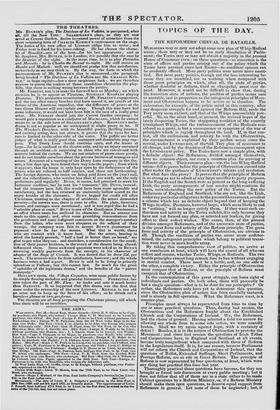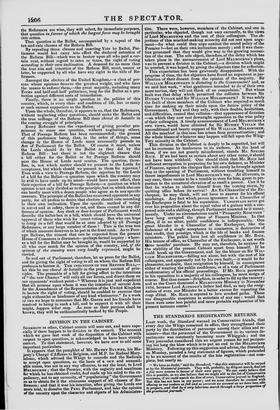(WICS OF THE DAY.
THE REFORMERS' CHEVAL DE BATAILLE.
MINISTERS may or may not adopt some new plan of Whig-Radical union ; there may or may not be an early dissolution of Parlia- ment ; the Tories may or may not obtain a majority in the present House of Commons even : on these questions—so uncertain is the state of affairs and parties arising out of the policy which the Tories have pursued since last Easter—no confident opinion can be prudently offered. Mere party politics were never more unset- tled. But mere party politics, though not the less interesting be- cause they are unsettled, are as nothing when compared with those great principles on which, after all, the state of parties, whether doubtful or definite, fixed or changeful, must ever de- pend. Moreover, it would not be difficult to show that, during the transition state of nations, the position of parties seems sure or unstable, just in proportion as the antagonist principles of Move- ment and Obstruction happen to be active or to slumber, The exhaustion, for example, of the public mind in this country, after our desperate struggle for and against the Reform Bill, made the Tory party seem extinct, and that of the Whigs unassailably pow- erful. So, on the other hand, at present, the revived hopes of the lately despairing Tories, the staggering condition of the recently triumphant Whigs, and the embarrassment of the Radicals con- sidered as a party, is but a consequence or symptom of the war of principles which is ragidg throughout the land. If, in that con- test, all the enthusiasm and activity be with the Obstructives, the circumstance is explained by their perfect union since the revival, under LYNDHURST, Of theold Tory plan of resistance to all change, and by the disunion of the Reformers consequent upon the LYNDHURST policy. The Tories have now a simple plan, with a definite object : the Reformers, divided amongst themselvds, have no common object, nor even a common plan for arriving at different objects. Their common plan—viz. the late Whig-Radical union—fell to pieces before the principle of Obstruction carried into effect under the guidance of LYNDHURST'S talents and resolution. But what does this prove ? It proves that the principle of Reform is so strong as not to admit of any large sacrifice to party purposes. If the English and the Scotch were as patient as the long-suffering Irish, the party arrangements of last session might continue for years, notwithstanding the new policy of the Tories. But the Reformers of England and Scotland, who are not, like the Irish, under any- particular obligations to the present Government, revolt at a scheme which has no definite object beyond that of keeping the Whigs in office. Promises, however large, which seem likely to end in "nothing," will no longer satisfy them. If they want such en- thusiasm and activity as the Tories exhibit, it is only because they have not yet formed any plan, or selected any leaders, for giving effect to their ardent wishes. The cause, then, of the present division amongst Reformers, and of the uncertain state of parties, is the great force and activity of the Reform principle. The great force and activity of the principle of Obstruction, are obvious to all. Though the condition of parties was never more undeter- mined, the antagonist principles which belong to political transi- tion were never in more hostile array.
By taking this comprehensive view of polities, we arrive at one conclusion at least, which will have the assent of all who can reflect and reason, whether Tories, Whigs, or Radicals. The two hostile principles cannot long remain face to face without engaging in mortal combat. There must be a battle, and, on one side or the other, a complete victory. Either the principle of Obstruction must conquer that of Reform, or the principle of Reform must vanquish that of Obstruction.
In the contemplation of this great struggle, one loses sight of individuals and parties. On both sides, there will presently be but a single question—what is to be done for our principles ? Of rather, the Reformers only have yet to determine this question, since the Obstructive plan of action has been carefully matured, and is already in full operation. What the Reformers want, is a counter-plan.
Principles must always be represented from time to time by one or more practical questions. Thus, during last session, the Obstructives and the Reformers fought about the Established Church and the Corporations of Ireland. We, the Reformers, had the choice of ground. Having selected a field too narrow for allowing our whole force to come into action, we were soundly beaten. Shall we try again against hope, with a certainty of defeat ? Besides, it is in the nature of Obstruction to provoke the Movement ; and since last session the questions of Irish Tithes and Corporations have, in England and Scotland at all events, become truly insignificant when compared with those of Reform in the Legislature itself. It is, for one reason, because Parliament will not reform the Church arid Corporations of Ireland, that the questions of Ballot, Extended Suffrage, Short Parliaments, and Peerage Reform, are so rife in Great Britain. The principle of Reform is now represented by four questions, at least, which were any thing but practical this time last year.
Thoroughly practical those questions have become, for they are brought or forced into discussion at every public meeting ; but it does not follow that all of them are in a state either to be made Cabinet questions by a Reform Ministry, or, if a Reform Ministry should make them open questions, to deserve equal support from Reformers in general. Let none of them be neglected ; but, if
the Reformers are wise, they will select, for immediate purposes, that question in favour of which the largest force may be brought into action.
That question is the Ballot, accompanied by a repeal of the tax-and-rate clauses of the Reform Bill.
By repealing those clauses and enacting Vote by Ballot, Par- liament would but carry into effect the declared intention of the Reform Bill—which was to bestow upon all who paid a cer- tain rent, without regard to rates or taxes, the right of voting according to their own inclination. A demand for no more than the true aim and intention of the Reform Bill, must, sooner or later, be supported by all who have any right to the title of Re- formers.
Amongst the electors of the United Kingdotn,—a class of per- sons whose opinions deserve the greatest weight, and who have the means to enforce them,—the great majority, including many Tories and half-and-half politicians, long for the Ballot as a pro- tection against different sorts of intimidation.
Finally, there is no single question in the polities of this country, which, in every class and condition of life, has so many or such earnest supporters as the Ballot.
Upon the whole, therefore, it appears to us, that the Reformers, without neglecting other questions, should make the Ballot and the true suffrage of the Reform Bill their cheval de bataille in the coming struggle of principles. Every Reformer sees the expediency of giving peculiar pro- minence to sonic one question, without neglecting others. That of Peerage Reform has been recommended; the ground of this preference being, that, in the order of things, some i change n the House of Lords must necessarily precede an Act of Parliament for the Ballot. Of course it must, unless the Lords should do by the Ballot as they did by the Reform Bill : but there is not the slightest chance that a bill either for the Ballot or for Peerage Reform should pass the House of Lords next session. The question, there- fore, is, not which matter should we present to the Lords for acceptance, but which should we present to them for rejection ? Even with a view to Peerage Reform, the rejection by the Lords of a bill for the Ballot—a question upon which the country may be seid to have made up its mind—would have more effect, than their rejection of a bill for Peerage Reform—a question on which opinion is not only divided as to the principle, but on which also one can hardly meet with a dozen people who agree as to any specific measure. The principle of the Ballot has no avowed opponent in any party, for all profess to desire that electors should vote according to their own inclination. Upon the specific method of voting in secret and in safety, there is not, and there cannot be any dif- ference of opinion. Any clerk or door-keeper of Parliament would describe the ballot-box in a bill, which should have the universal approval of these who wish for Fecret voting. But who can hope to bring in a bill that would be at once adopted by all Peerage Reformers, or any large number of them ? This is the true test of which measure deserves to be put in the front rank. As to Peer- age Reform, the utmost that can be expected from the present House of Commons is discussion—perhaps formal inquiry : where- as a bill for the Ballot may be brought in, would be supported by all who care much for the opinion of the country, and, if the opinion of the country were very loudly expressed, might be carried.
In and out of Parliament, therefore, let us press for the Ballot, and for giving the right of voting to all on whom the Reform Bill professes to bestow it. THE INTENTION OF THE REFORM BILL,— let this be our cheval de bataille in the present contest of prin- ciples. The preamble of a bill for giving effect to the intentions of" the new Charter" will rally all our forces, and direct them on our opponents' weakest point—" Whereas it is just and expedient that all persons upon whom it was the intention of several Acts for the Amendment of the Representation of the United Kingdom to bestow the right of voting, should be enabled to exercise that right withoutlet or hindrance of any kind whatsoever." In a week or two we hope to announce that Mr. GROTE and his friends have resolved to bring in such a bill, and to support it with all their might, happen what may. As soon as their purpose shall be known, they will be enthusiastically backed by the People.



























 Previous page
Previous page